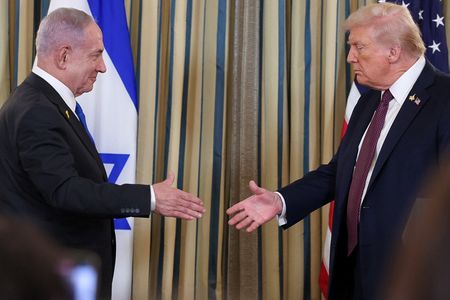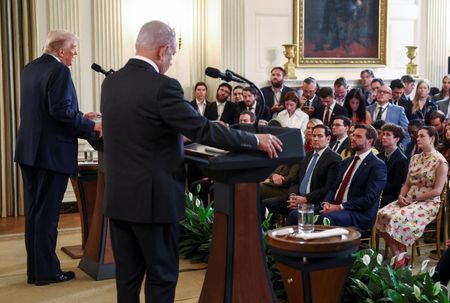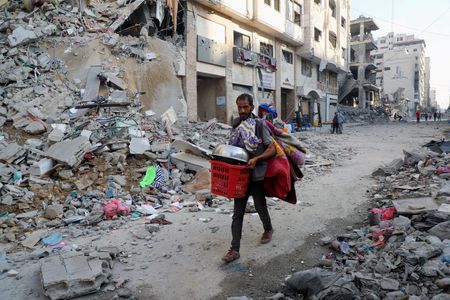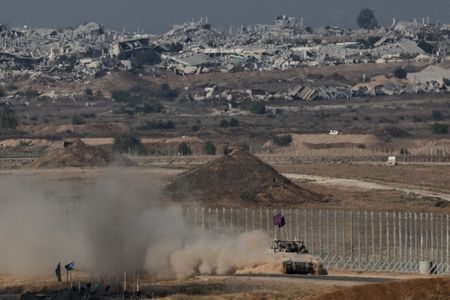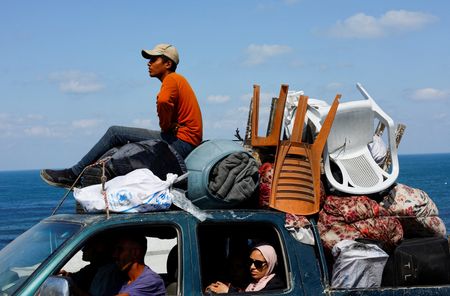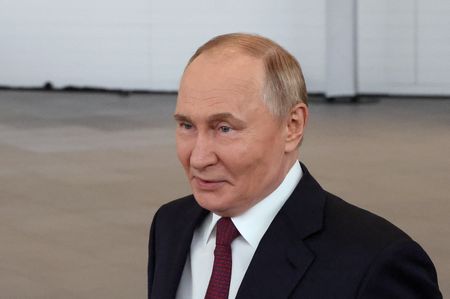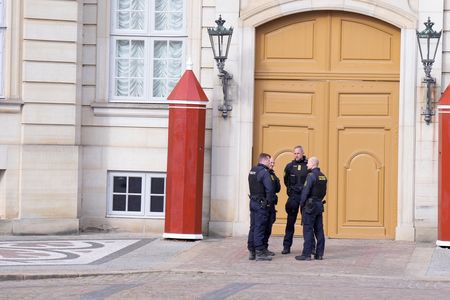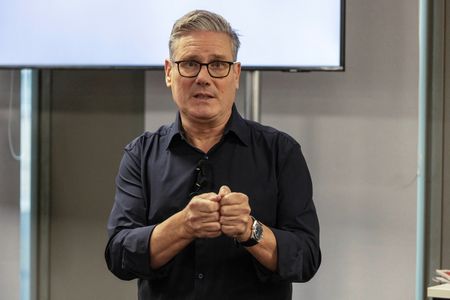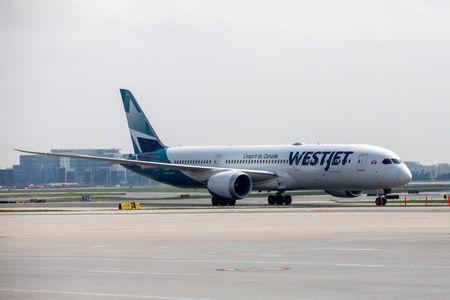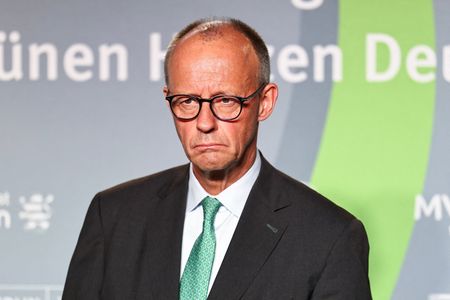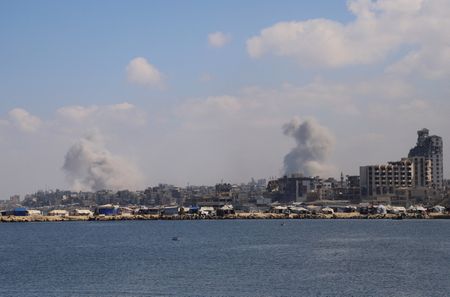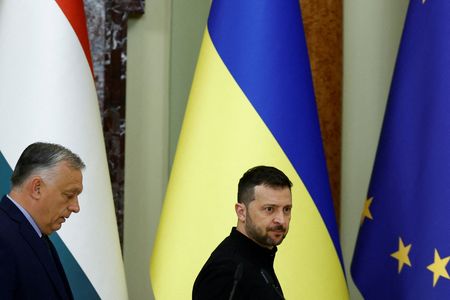By Matt Spetalnick, Trevor Hunnicutt and Nidal al-Mughrabi
WASHINGTON/CAIRO/JERUSALEM (Reuters) -President Donald Trump secured Israeli Prime Minister Benjamin Netanyahu’s backing on Monday for a U.S.-sponsored peace proposal to end a nearly two-year-old war in Gaza, but questions loomed over whether Hamas would accept the plan.
Speaking at a joint White House press conference, Trump said they were “beyond very close” to an elusive peace deal for the Palestinian enclave, but warned the Islamist group Hamas that Israel would have full U.S. support to take whatever action it deemed necessary if the militants reject what he has offered.
The White House released a 20-point document that called for an immediate ceasefire, an exchange of hostages held by Hamas for Palestinian prisoners held by Israel, a staged Israeli withdrawal from Gaza, Hamas disarmament and a transitional government led by an international body.
Trump thanked Netanyahu “for agreeing to the plan and for trusting that if we work together, we can bring an end to the death and destruction that we’ve seen for so many years, decades, even centuries.”
NETANYAHU SAYS PLAN MEETS ISRAEL’S WAR AIMS
Standing next to Trump, Netanyahu responded: “I support your plan to end the war in Gaza, which achieves our war aims.
“It will bring back to Israel all our hostages, dismantle Hamas’ military capabilities, end its political rule, and ensure that Gaza never again poses a threat to Israel,” he said.
It was clear, however, that Hamas remained the key to whether Trump’s peace proposals get off the ground. The group’s absence from negotiations and its previous repeated refusals to disarm raised doubts about the plan’s viability.
Hamas, which triggered the war with its October 7, 2023, attack on Israel, still holds 48 hostages, 20 of them still alive, Israel says.
“Hamas hasn’t yet received the plan officially, nothing beyond media publication,” a Hamas official told Reuters.
But an official briefed on the talks later said Qatar and Egypt shared the document with Hamas, which told mediators they will review it “in good faith” and then respond.
In Netanyahu’s fourth White House visit since Trump returned to office in January, the right-wing Israeli leader was looking to bolster his country’s most important relationship after a slew of Western leaders formally embraced Palestinian statehood at the United Nations last week in defiance of the U.S. and Israel.
Trump, who sharply criticized the recognition of statehood as a prize for Hamas, went into Monday’s meeting seeking to overcome Netanyahu’s misgivings over parts of the plan.
It marked a stepped-up diplomatic effort from the U.S. president, who vowed during the 2024 presidential campaign to quickly bring the conflict to a close and has since repeatedly claimed that a peace deal was near, only for it to fail to materialize.
Washington outlined its peace plan to Arab and Muslim states on the sidelines of the U.N. General Assembly last week.
Trump presented his set of proposals in effusive terms on Monday but ended what was billed as a press conference without taking questions.
He has previously hailed international deals that delivered less than promised. He headed into an August summit in Alaska with Russian President Vladimir Putin seeking a ceasefire in the Ukraine war and emerged with no such deal. Nonetheless, he called the meeting “a 10” on a scale of one to 10.
Netanyahu, while praising Trump as a friend of Israel, put some distance between himself and some items in Trump’s plan, including the reforms being demanded of the internationally recognized Palestinian Authority and the prospects for eventual Palestinian statehood.
It was not immediately clear whether the Trump administration and Israel had resolved all their differences.
Netanyahu is under mounting pressure from the hostages’ families and, according to public opinion polls, a war-weary Israeli public. But he also risks the collapse of his governing coalition if far-right ministers believe he has made too many concessions for a peace deal.
Steven Cook, a senior fellow of the Council on Foreign Relations think-tank, said an end to the war may be closer but cautioned that further work was needed. “The Qataris now must put the screws to Hamas and Netanyahu needs to sell to his security cabinet,” he said.
Hamas-led fighters killed around 1,200 people and captured 251 hostages in the October 7, 2023, attack on Israel, according to Israeli tallies. More than 66,000 Palestinians have since been killed in Israel’s assault, according to Gaza health authorities.
ISRAELI ASSAULT HAS LEFT MUCH OF GAZA IN RUINS
Israel launched one of its biggest offensives of the war this month, with Netanyahu saying he aims to wipe out Hamas in its final redoubts. The war has left much of Gaza in ruins and caused a major humanitarian crisis.
The U.S. plan, crafted by special envoy Steve Witkoff and Trump first-term Middle East adviser, Jared Kushner, envisions a ceasefire followed by the release within 72 hours of all remaining hostages in exchange for hundreds of Palestinian prisoners, and the gradual withdrawal of Israeli forces.
It outlines a vague path toward Palestinian statehood once Gaza’s redevelopment is well under way and the Palestinian Authority undertakes reforms, but does not provide details.
The question of eventual Palestinian statehood, which Netanyahu has vowed never to let happen, was among the main sticking points to Netanyahu’s acceptance of Trump’s initiative, according to a source close to the talks.
Under the plan, the U.S. would work with Arab partners and other international parties to develop a temporary stabilization force to oversee security.
Gaza would be governed without Hamas involvement and initially only a limited role for a Palestinian Authority “representative.” Netanyahu has said the PA must not control the territory.
The proposal calls for creation of a technocratic Palestinian committee responsible temporarily for day-to-day Gaza services, overseen by an international “board of peace” chaired by Trump and including former British Prime Minister Tony Blair, the White House said.
(Reporting by Matt Spetalnick, Steve Holland and Trevor Hunnicutt in Washington, Howard Goller in New York, Nidal al-Mughrabi in Cairo, Alexander Cornwell in Jerusalem; Writing by Matt Spetalnick; Editing by Peter Graff, Jon Boyle, Aidan Lewis, Nia Williams and Howard Goller)

